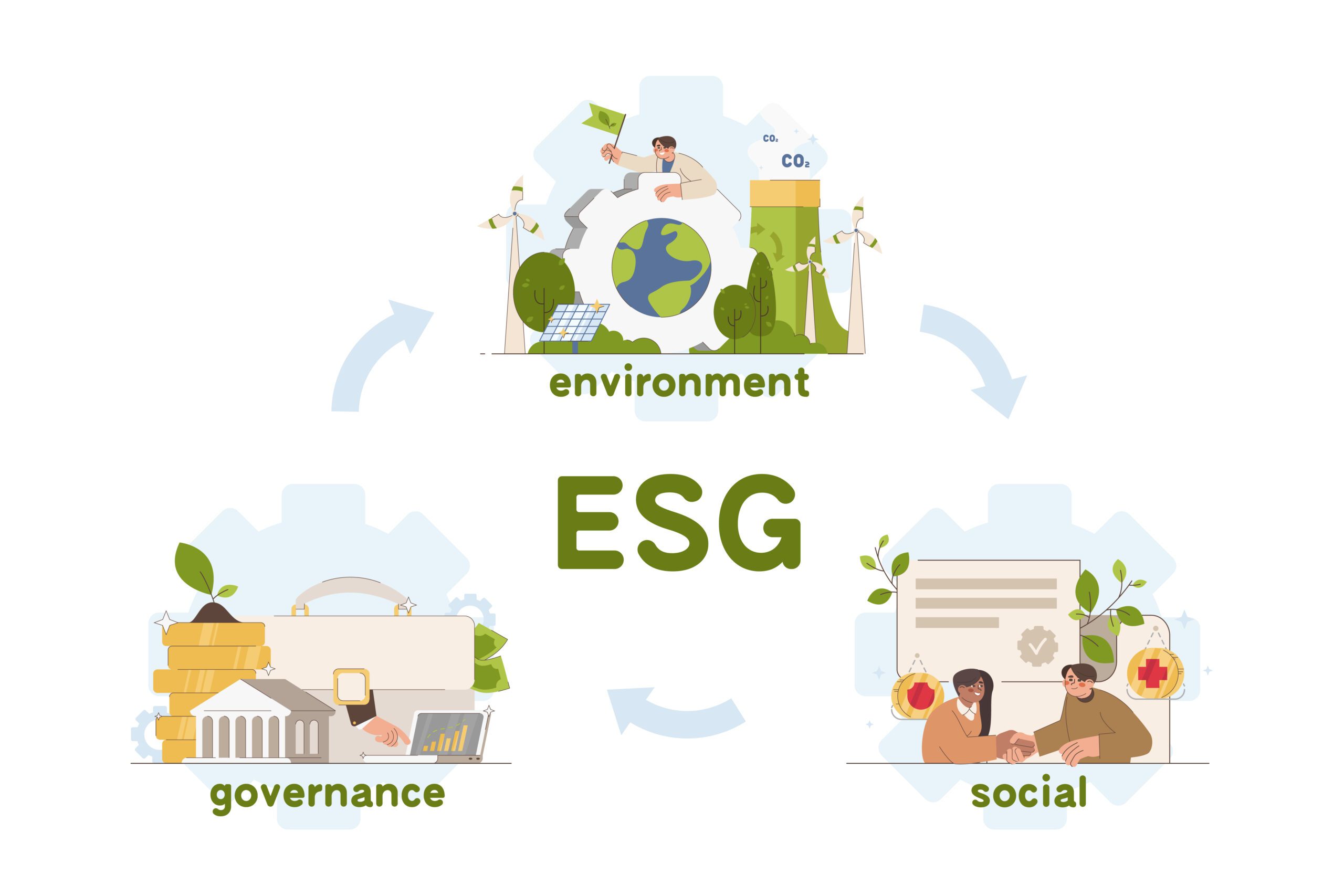Environmental, Social, and Governance (ESG) investing is a strategy that evaluates companies based on their performance in three key areas: environmental impact, social responsibility, and corporate governance practices.
This approach goes beyond traditional financial metrics to assess how companies manage their impact on the planet, treat people, and govern themselves. ESG investing aims to align financial returns with ethical considerations, encouraging investments in businesses that prioritize sustainability, social justice, and ethical leadership.


Table of Contents
Environmental, Social, and Governance (ESG) – Understanding with Example
Imagine you have some money to invest. ESG investing is like choosing where to put that money based not only on how much profit you might make but also on how a company treats the planet, people, and runs its business.
For example, think about a company that makes electric cars like Tesla. They’re big on saving energy and reducing pollution, so if you care about the environment, investing in Tesla could be a way to support that cause while potentially making money.
Similarly, let’s say there’s a company like Patagonia that makes outdoor gear. They’re famous for caring about the environment and supporting social causes. Investing in them could mean supporting a business that’s doing good for the planet and society while also aiming for financial growth.


So, ESG investing is about picking companies not just for profits, but also because they’re doing good things for the environment, treating people well, and running their business ethically.
How Environmental, Social, and Governance (ESG) Investing Works
ESG investing represents a paradigm shift in the world of finance. Beyond the traditional focus on financial metrics, this strategy evaluates companies based on three crucial factors: Environmental, Social, and Governance considerations. Let’s delve into each aspect to understand how they shape investment decisions.
Environmental Factors: In today’s world, environmental responsibility is a cornerstone of sustainable business practices. ESG investing scrutinizes a company’s impact on the planet. This includes assessing its carbon footprint, energy efficiency initiatives, waste management strategies, and overall commitment to sustainability. For instance, companies like Tesla, known for their electric vehicles reducing reliance on fossil fuels, or Unilever with its Sustainable Living Plan promoting eco-friendly products, showcase strong environmental commitments.
Social Aspects: How a company treats its employees, engages with communities, and contributes to society are integral components of ESG evaluation. Diversity and inclusion policies, labor practices, community engagement initiatives, and philanthropic efforts fall under this category. Examples include companies like Microsoft, known for its diversity and inclusion programs, or Patagonia, renowned for its activism and environmental contributions beyond its core business.
Governance Principles: Governance factors focus on the structure and practices of a company’s leadership. This involves evaluating board diversity, executive compensation, transparency in financial reporting, and measures to prevent corruption or unethical behavior. Companies like Alphabet (Google’s parent company), praised for its transparent corporate governance and innovative leadership, serve as exemplars in this domain.
ESG Criteria
Assessing a company’s ESG performance involves a myriad of metrics and methodologies. Various rating agencies and indices offer ESG scores based on specific criteria. These can include quantifiable data like greenhouse gas emissions, gender diversity ratios in leadership positions, employee turnover rates, or softer aspects like ethical supply chain practices and stakeholder engagement. For instance, MSCI, Sustainalytics, and FTSE Russell are renowned for their ESG ratings, helping investors gauge a company’s sustainability performance.
Pros of ESG Investing
One of the primary advantages of ESG investing is its potential to align personal values with investment decisions. By supporting companies that prioritize sustainability and ethical practices, investors can contribute to positive societal and environmental impacts. Moreover, research indicates that companies with robust ESG practices might experience better long-term financial performance and reduced risk exposure due to their focus on sustainability and good governance.


Cons of ESG Investing
While Environmental, Social, and Governance (ESG) initiatives have gained traction as a means to assess a company’s ethical and sustainable practices, they do come with some drawbacks. One concern is the lack of standardized metrics, which can lead to inconsistent or subjective evaluations across different organizations. This variability can make it challenging for investors to compare ESG performances accurately.
Additionally, companies might engage in “greenwashing,” where they exaggerate or misrepresent their ESG efforts to appear more socially responsible than they actually are. Moreover, focusing excessively on ESG criteria might divert attention from other crucial aspects of business performance, potentially neglecting financial metrics and short-term shareholder returns, which could hinder competitiveness in certain industries.
ESG Investing FAQs
1. Can ESG investing deliver competitive returns? Yes, numerous studies suggest that companies with strong ESG practices can outperform financially over the long term. While short-term returns may fluctuate, the focus on sustainability and responsible practices often translates into resilience and growth in the future.
2. How can I start ESG investing? To begin ESG investing, research ESG-focused funds or indices that align with your values and investment goals. Many online brokerage platforms offer ESG-themed investment options, making it easier for investors to diversify while staying aligned with their ethical principles.
3. Are ESG investments limited to specific industries? No, ESG investing spans across various industries. Companies in sectors like technology, healthcare, finance, and energy are evaluated based on their environmental, social, and governance practices, providing ample investment opportunities across diverse sectors.
The Bottom Line
ESG investing represents a significant shift towards considering broader societal and environmental impacts in investment decisions. While it presents an avenue to align investments with personal values and contribute to positive change, it’s crucial to research and understand the nuances of ESG criteria and their implications on investment returns. As the global focus on sustainability and ethical practices intensifies, ESG investing is poised to gain further momentum among investors seeking both financial returns and positive societal impact.



